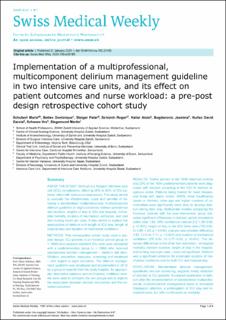Please use this identifier to cite or link to this item:
https://doi.org/10.21256/zhaw-19585| Publication type: | Article in scientific journal |
| Type of review: | Peer review (publication) |
| Title: | Implementation of a multiprofessional, multicomponent delirium management guideline in two intensive care units, and its effect on patient outcomes and nurse workload : a pre-post design retrospective cohort study |
| Authors: | Schubert, Maria Bettex, Dominique Steiger, Peter Schrch, Roger Haller, Alois Bogdanovic, Jasmina Garcia Nuez, David Schwarz, Urs Siegemund, Martin |
| et. al: | No |
| DOI: | 10.4414/smw.2020.20185 10.21256/zhaw-19585 |
| Published in: | Swiss Medical Weekly |
| Volume(Issue): | 150 |
| Issue: | w20185 |
| Issue Date: | 21-Jan-2020 |
| Publisher / Ed. Institution: | EMH Schweizerischer Ärzteverlag |
| ISSN: | 1424-3997 1424-7860 |
| Language: | English |
| Subjects: | Postoperative delirium; Delirium management; Critically ill patients; Mortality rates; Nursing hours; Before and after design |
| Subject (DDC): | 610.73: Nursing 616.8: Neurology, diseases of nervous system |
| Abstract: | AIM OF THE STUDY: Delirium is a frequent intensive care unit (ICU) complication, affecting 26% to 80% of ICU patients, often with serious consequences. This study aimed to evaluate the effectiveness, costs and benefits of following a standardised multiprofessional, multicomponent delirium guideline on eight outcomes: delirium prevalence and duration, lengths of stay in ICU and hospital, in-hospital mortality, duration of mechanical ventilation, and cost and nursing hours per case. It also aimed to explore the associations of delirium with length of ICU stay, length of hospital stay and duration of mechanical ventilation. METHODS: This retrospective cohort study used a pre-post design. ICU patients in an historical control group (n = 1608) who received standard ICU care were compared with a postintervention group (n = 1684) who received standardised delirium management – delirium risk identification, preventive measures, screening and treatment – with regard to eight outcomes. The delirium management guideline was developed and implemented in 2012 by a group of experts from the study hospital. As appropriate, descriptive statistics and multivariate, multilevel models were used to compare the two groups and to explore the association between delirium occurrence and the selected outcomes. RESULTS: Twelve percent of the 1608 historical controls and 20% of the 1684 postintervention patients were diagnosed with delirium according to the ICD-10 delirium diagnosis codes. Patients being treated for heart disease, and those with septic shock, ARDS, renal insufficiency (acute or chronic), older age and higher numbers of comorbidities were significantly more likely to develop delirium during their stay. Multivariate models comparing the historical controls with the post intervention group indicated significant differences in delirium period prevalence (odds ratio 1.68, 95% confidence interval [CI] 1.38–2.06; p <0.001), length of stay in the ICU (time ratio [TR] 0.94, CI 0.89–1.00; p = 0.048), cost per case (median difference 3.83, CI 0.54–7.11; p = 0.023) and duration of mechanical ventilation (TR 0.84, CI 0.77–0.92; p <0.001). The observed differences in the other four outcomes – in-hospital mortality, delirium duration, length of stay in the hospital, and nursing hours per case – were not significant. Delirium was a significant predictor for prolonged duration of mechanical ventilation and for both ICU and hospital stay. CONCLUSION: Standardised delirium management, specifically delirium screening, supports timely detection of delirium in ICU patients. Increased awareness of delirium after the implementation of standardised multiprofessional, multicomponent management leads to increased therapeutic attention, a prolongation of ICU stay and increased costs, but with no influence on mortality. |
| URI: | https://digitalcollection.zhaw.ch/handle/11475/19585 |
| Fulltext version: | Published version |
| License (according to publishing contract): | CC BY-NC-ND 4.0: Attribution - Non commercial - No derivatives 4.0 International |
| Departement: | School of Health Sciences |
| Organisational Unit: | Institute of Nursing (IPF) |
| Appears in collections: | Publikationen Gesundheit |
Files in This Item:
| File | Description | Size | Format | |
|---|---|---|---|---|
| smw_2020_20185.pdf | 596.6 kB | Adobe PDF |  View/Open |
Show full item record
Schubert, M., Bettex, D., Steiger, P., Schrch, R., Haller, A., Bogdanovic, J., Garcia Nuez, D., Schwarz, U., & Siegemund, M. (2020). Implementation of a multiprofessional, multicomponent delirium management guideline in two intensive care units, and its effect on patient outcomes and nurse workload : a pre-post design retrospective cohort study. Swiss Medical Weekly, 150(w20185). https://doi.org/10.4414/smw.2020.20185
Schubert, M. et al. (2020) ‘Implementation of a multiprofessional, multicomponent delirium management guideline in two intensive care units, and its effect on patient outcomes and nurse workload : a pre-post design retrospective cohort study’, Swiss Medical Weekly, 150(w20185). Available at: https://doi.org/10.4414/smw.2020.20185.
M. Schubert et al., “Implementation of a multiprofessional, multicomponent delirium management guideline in two intensive care units, and its effect on patient outcomes and nurse workload : a pre-post design retrospective cohort study,” Swiss Medical Weekly, vol. 150, no. w20185, Jan. 2020, doi: 10.4414/smw.2020.20185.
SCHUBERT, Maria, Dominique BETTEX, Peter STEIGER, Roger SCHRCH, Alois HALLER, Jasmina BOGDANOVIC, David GARCIA NUEZ, Urs SCHWARZ und Martin SIEGEMUND, 2020. Implementation of a multiprofessional, multicomponent delirium management guideline in two intensive care units, and its effect on patient outcomes and nurse workload : a pre-post design retrospective cohort study. Swiss Medical Weekly. 21 Januar 2020. Bd. 150, Nr. w20185. DOI 10.4414/smw.2020.20185
Schubert, Maria, Dominique Bettex, Peter Steiger, Roger Schrch, Alois Haller, Jasmina Bogdanovic, David Garcia Nuez, Urs Schwarz, and Martin Siegemund. 2020. “Implementation of a Multiprofessional, Multicomponent Delirium Management Guideline in Two Intensive Care Units, and Its Effect on Patient Outcomes and Nurse Workload : A Pre-Post Design Retrospective Cohort Study.” Swiss Medical Weekly 150 (w20185). https://doi.org/10.4414/smw.2020.20185.
Schubert, Maria, et al. “Implementation of a Multiprofessional, Multicomponent Delirium Management Guideline in Two Intensive Care Units, and Its Effect on Patient Outcomes and Nurse Workload : A Pre-Post Design Retrospective Cohort Study.” Swiss Medical Weekly, vol. 150, no. w20185, Jan. 2020, https://doi.org/10.4414/smw.2020.20185.
Items in DSpace are protected by copyright, with all rights reserved, unless otherwise indicated.